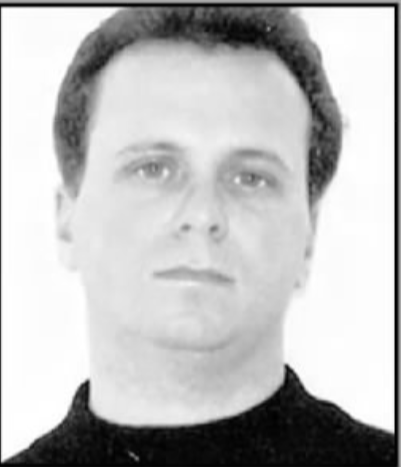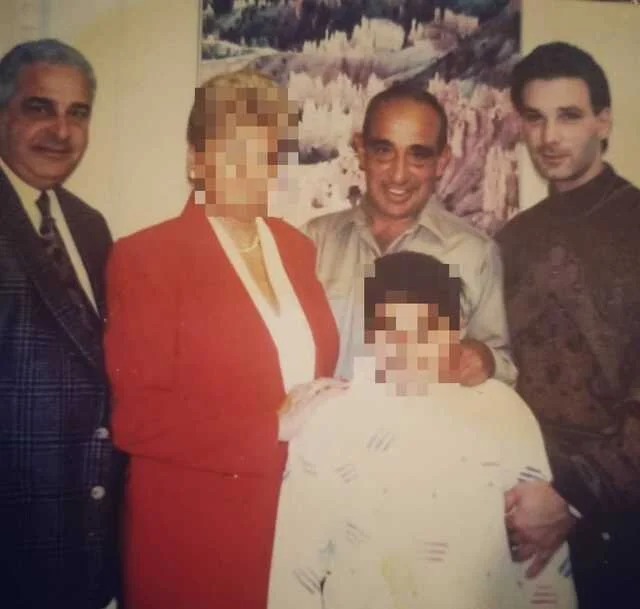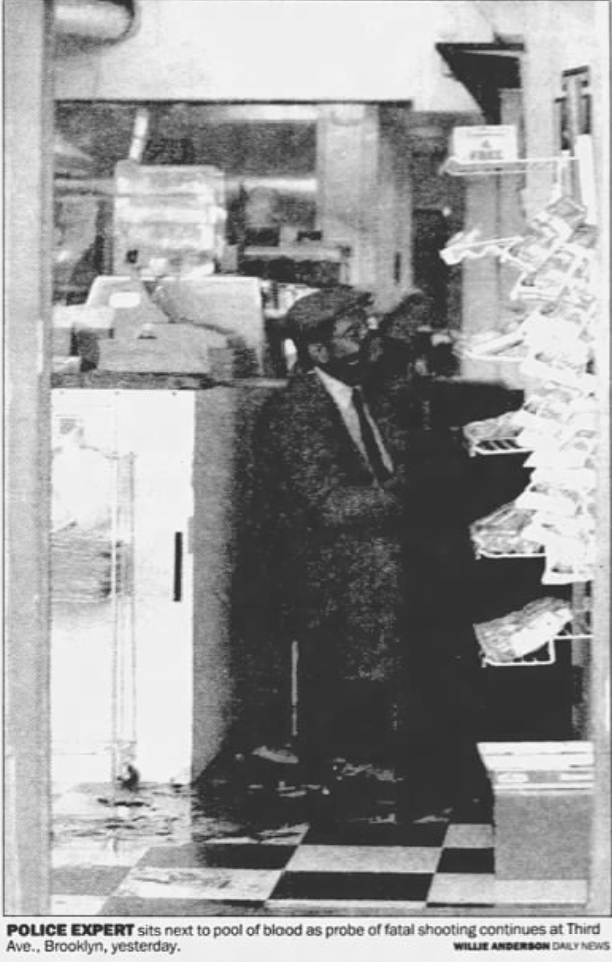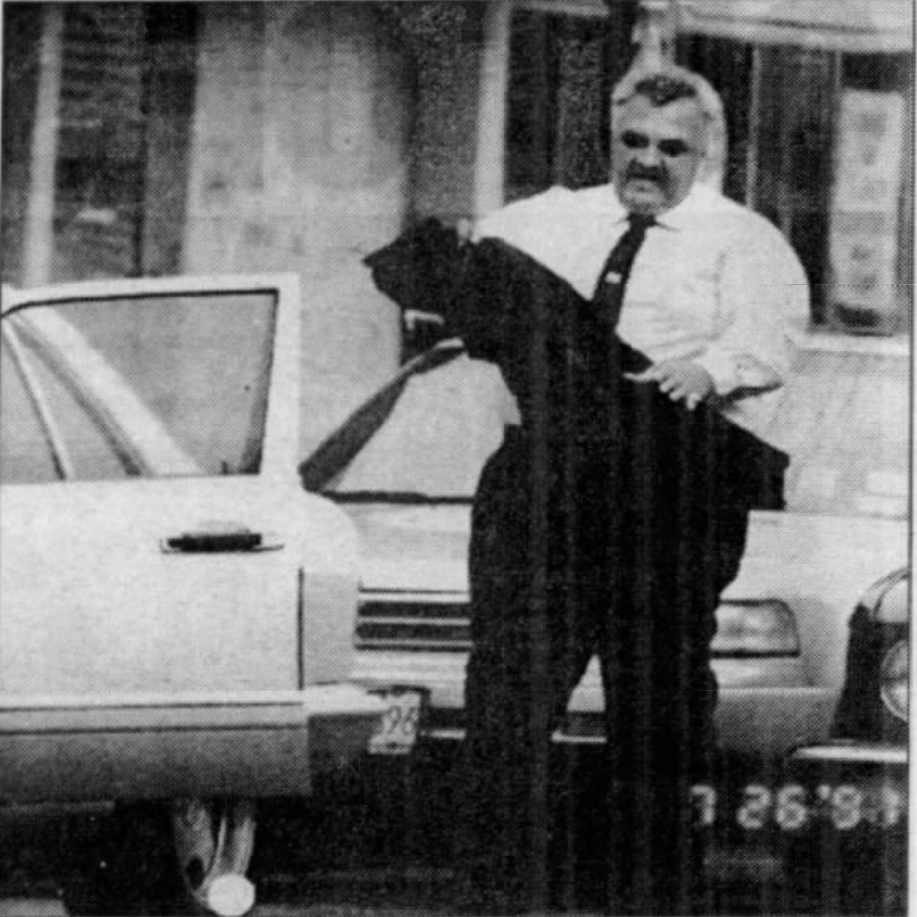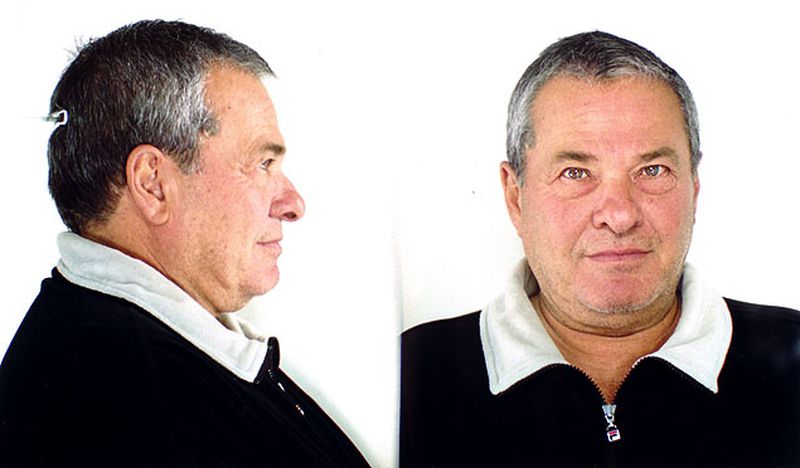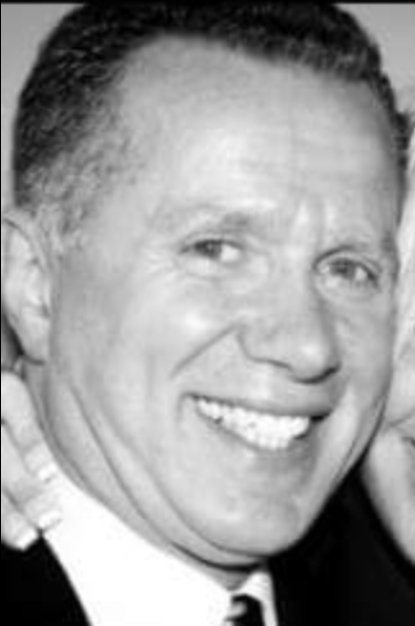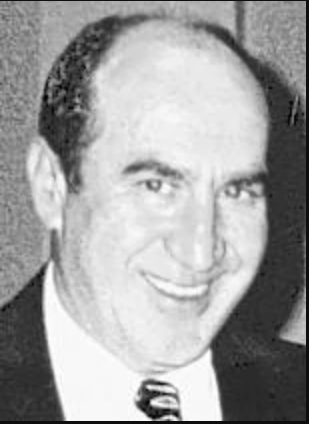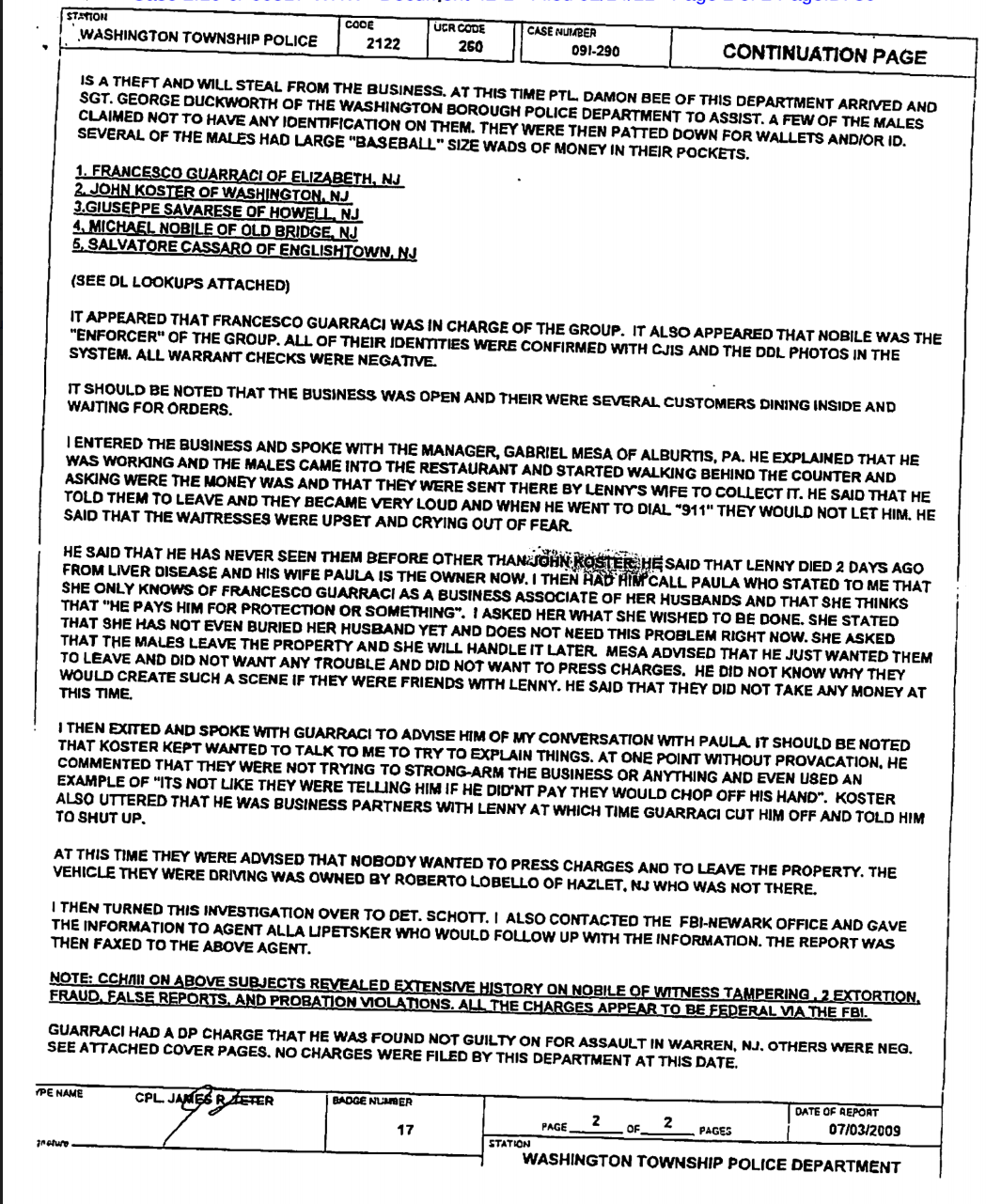This article is based on various court documents and federal indictments relating to the October 2019 indictment of Joseph Amato and nineteen others, and was the result of a nine-month FBI investigation involving wiretaps and physical surveillance. Please note that as of this article’s publication, the defendants have not yet been found guilty of any crimes in the indictment.
The Godfather of Staten Island (Part 1)
February 6, 2020
From left: Joseph Amato Jr. and Joseph Amato Sr. (via Gang Land News)
Joseph Amato Jr., left, before Magistrate Judge Vera Scanlon (Jane Rosenberg, New York Post).
“You’re gonna look like Barzini, or what?”
After a few years of well-appreciated calm, the Colombo crime family of New York recently returned to the headlines after the unsealing of three federal indictments against 20 members and associates on October 3, 2019, in Brooklyn Federal Court. The federal racketeering case was nine months in the making and centers around the Colombo organization’s so-called "boss of Staten Island," Joseph Amato. Prosecutors accused the 60-year-old Amato of leading an enterprising crew of Brooklyn & Staten Island wiseguys, allegedly involved in everything from loansharking to drug dealing to fixing college basketball. Amato is an intriguing figure as far as modern-day mafioso go. A week before the October indictments, we published a comprehensive spotlight article about him, where we also predicted some of the impending charges that prosecutors were filing against him. To read further about Amato's backstory in the 1980s and 1990s, click on the link above.
The 31-count indictment against Amato and his core crew centered around a nine-month FBI investigation that relied on old-fashioned physical & telephone surveillance. Amato, who has been a high-ranking Colombo figure since the 1990s, usually spoke in codewords and innuendo over the telephone to his crew, but the investigation picked up steam when the feds targeted two of Amato’s closest confidantes. His right-hand-man, Thomas Scorcia, was the classic stereotype of a Mafia goon. A plumber by trade, Scorcia controlled a loansharking operation that Assistant U.S. Attorney Elizabeth Geddes valued at "hundreds of thousands" of dollars on the street. But he had one key fault, which was his absent-minded propensity to talk about criminal activity over his cellphone, giving the FBI an inside look into his sprawling shylocking operation.
"He spent a significant portion of his time just making call after call after call directing people to meet him at particular locations, directing people to leave money under his mat, et cetera," said prosecutor Geddes at Scorcia’s bail hearing.
Amato’s 26-year-old son, Joseph Jr., was even more of an aid to the FBI’s investigation. Along with his clique of Staten Island tough guys, Junior regaled about recent beatdowns and planned upcoming extortions over the phone, all of which was caught on tape by the FBI’s surveillance team. But the investigation actually dates back even further and began not with the FBI, but with a team of worried mechanics at Staten Island’s Metropolitan Transportation Authority.
Amato’s first slip in his short reign as captain was comprising his freedom for love. As cheesy as that sounds, the crime that brought Amato to the attention of the FBI was not related to the Colombo crime family, but with his dysfunctional love life. It was mid-2016, and Amato had been a free man since 2009, when he completed a sixteen-year federal sentence. He was quickly regaining his old stripes in the Colombo mob, and was forming a powerful crew of henchmen in Staten Island. The only thing that was going wrong was his relationship with his girlfriend, which was getting more and more dysfunctional. Using a GPS tracker placed on her car, Amato started stalking her and using the information to harass her online. After blocking him on every other form of communication, Amato fired off unsettling emails which the FBI were able to recover the following year.
"This is my island. Not yours. I have eyes all over(.)"
In another, Amato wrote; "I'm called a MANS MAN!!! … Anyone could end up in jail. I don't wish it on anyone(.) Especially weak men. Who could never deal with it. I thrived there and anywhere I go."
The FBI dug up those emails after searching Amato’s house in May of 2017. Amato had been referred to them by the local cops, who had discovered his GPS tracker in an unlikely place. After discovering the tracker, Amato’s girlfriend tried to throw him off course by placing the tracker on a Staten Island bus, where it remained until that November, when mechanics at the depot discovered it in the oil pan.
According to a New York Post exclusive, it took a while before anyone could figure out what the small contraption was, and nobody wanted to get close in case it was a bomb. In the end, "explosives experts" summoned to diffuse the potential weapon discovered that it was, in fact, a legally-acquired GPS tracker. They contacted the manufacturer, who pointed investigators to the owner - Joseph Amato.
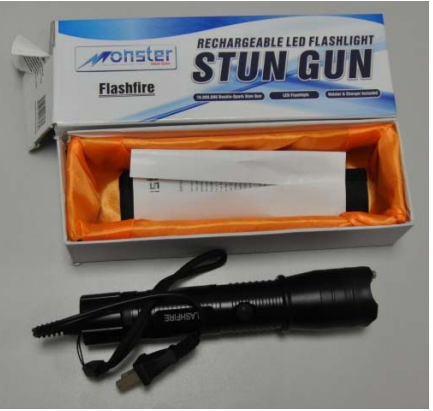
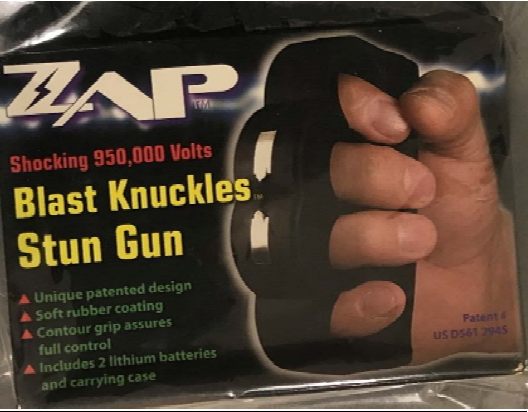
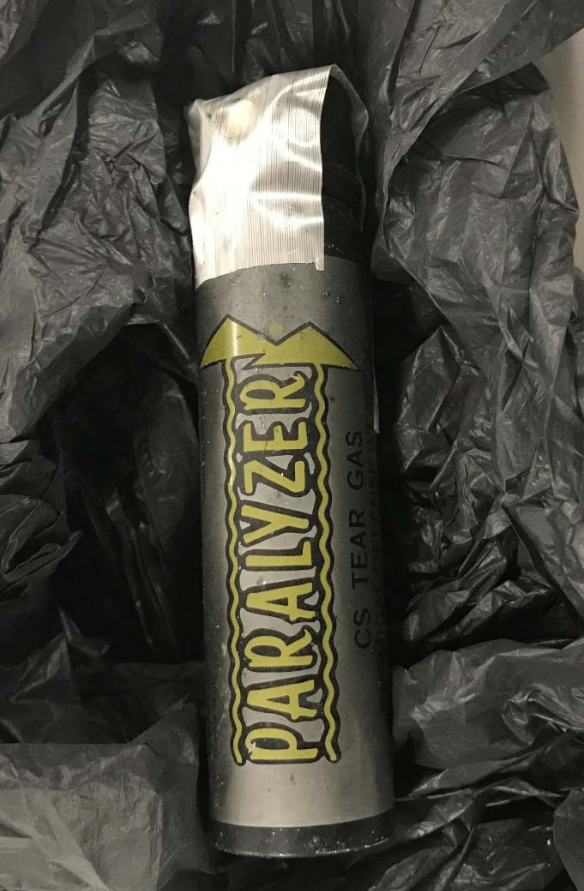
It took until May of 2017 before the FBI raided Amato’s home in Colts Neck, New Jersey. They discovered that not only was the lovestruck ex-felon was planning to continue his stalking, but he was also amassing a small arsenal of random weapons.
Stashed around Amato’s house were two tasers, one of them masked as a flashlight, as well as a canister of apparent tear gas, with the word "Paralyser" written on the exterior. The FBI also identified another wireless tracker that Amato had bought online, and quickly confiscated it. Since Joey was an ex-con, it was a crime for him to be in possession of those weapons, and his stalking should have also brought him in front of a judge. But the FBI held back on any criminal charges. It might have due to a lack of funding, or an uncomprising bureucracy, but it took until October of 2018 before the FBI sent a dedicated team of agents after the Staten Island Mafia boss.
That's a subject that defense lawyers for Amato and his crew are quick to note. If Amato was such a high-risk target, why did they wait so long to take action and investigate? Why did they take so long to search his house, and after finding his arsenal of weaponry, why didn't they arrest him? In fact, why did they let him roam free for another year-and-a-half before putting a wiretap on his phone?
Mathew Mari, a frequent defense attorney for high-profile Mafia clientele and a lawyer for one of the Amato co-defendants, posed a different theory. He alleges that the feds were looking for an excuse to target Amato due to his supposed mob ties, and the stalking allegations were a convenient starting point. The feds, Mari said, got a hold of the GPS tracking device and "used that as an excuse" to kickstart their delayed investigation, according to a comment he made to the New York Post.
It's indeed interesting why the feds held off for so long before pursuing a potentially dangerous stalker and Mafia captain. They had the power to withhold any criminal charges to do with the search, but it seems they didn't have the resources or budget to go after Amato further. One reason for that might be due to increasingly severe financial cuts that the FBI's Organized Crime units have been receiving ever since terrorism became the top priority. The biggest of these cutbacks was in 2011, when the five separate FBI squads responsible for each of New York's Mafia families were downsized, to only two crews left to combat all five. One squad was responsible for keeping tabs on the Bonanno, Colombo, and Genovese families - only dozens of agents to pursue at least 400 inducted mobsters. With a lack of resources, it seems that Amato was mostly left to his own devices until the feds completed their separate incursions of both the Bonanno and Genovese crime groups, who have been targeted with heavy law enforcement scrutiny over the past five years.
The long delays in the half-hearted investigation should have given Amato and his guys a chance to prepare. It should have reminded them to avoid talking on phones. Amato, of all people, should have known all too well how hard the FBI could hit when they wanted to. He came up in an era where the mob was Public Enemy #1 for New York prosecutors and federal agents. In the early 1990s, Amato was thrust into the spotlight as a young "acting capo" responsible for a regiment of rebel Colombo soldiers in the family’s civil war. At only 33 years old, he was leading an armed crew that patrolled Brooklyn on the hunt for enemy faction members during the two-year conflict.
Joey Amato in 1993.
Amato's burgeoning ascension in the crime family was only possible after his captain, Patty Amato, was indicted in May of 1992 for racketeering and murder. Patty, despite his surname, wasn't related to Joey at all, but their "father-son" relationship had many in the Colombo ranks fooled. Joey was his right-hand-man and protégé, as well as his full-time driver during the 1980s. Before he was 30, Joey was driving his mentor to major-league meetings with acting boss Vic Orena and other bigwigs, and learning firsthand how the dirty politics of the Colombo Mafia worked.
The double-crossing in the family reached its peak in the closing years of the 1980s. At the top, various groups were plotting to usurp power ever since the family's administration was left in turmoil in 1984. That year, the boss, underboss, and consigliere, as well as three captains, were indicted on federal RICO charges relating to the mob's citywide control of New York's concrete industry. Those charges were eventually laid against all of New York's crime groups who participated in the so-called "Concrete Club." Still, the Colombos were hit the hardest and paid a steep price in the following years.
Carmine “Junior” Persico (center) in his prison khakis. On the far left is younger brother Theodore “Uncle Teddy” Persico Sr., a Colombo family captain, and on the far right is Carmine’s son, Michael Persico, a high-ranking associate. (Source: Black Hand forum member givememysocks).
In the mob, a boss can only lose his position through death or retirement. A prison sentence typically gives way to a boss passing the torch to the next in line, but this wasn't the case with the 51-year-old boss of the Colombos. When Carmine "Junior" Persico was sentenced to 139 consecutive years in prison, he announced he would continue to lead the family from behind bars. He upheld this decision even after the government moved him to Lompoc, California, on the opposite coast.
From his cell, Persico used a cadre of relatives and allies to maintain control, and - after a process of trial-and-error - picked his cousin, Vic Orena, to be the family's acting boss until Persico's son was slated to leave prison in 1994. But Orena eventually settled into the spot and sought to be more than just the "acting" boss. He wanted to make things official, and he certainly wasn't going to move over when Persico's eldest son got out. Orena knew that orchestrating a coup would pit him against Junior Persico's loyalist forces on the street, so he curried favor with the rest of the family's caporegimes.
Patty Amato was one of them. As Vic Orena ingratiated himself with Patty, he made it a point to induct all of the captain’s most trusted associates. First on that list was Joey Amato, who Little Vic brought into the family around 1990, according to underworld informants. When he wasn't chauffeuring Patty, the young Joey did pretty well for himself with a thriving crew of his own. Out of a social club he operated on 71st St. and Fort Hamilton Parkway, Amato ran a multi-level loansharking operation, where he financed other loansharks in his crew. According to one former underling, Amato also had interests in electrical unions and hooked up no-show union jobs for his buddies.
When the Colombo family's power struggle got violent in late 1991, Joey was called to arms as a soldier in the rebel faction led by Little Vic. He was young, but Joey was given the full respect of his peers at faction meetings since he had a platoon of killers and hitmen under him. He may not have called the shots, but Amato was the guy who put the battleplans made by aging Mafia dons into action. We spoke to one turncoat Orena faction associate who asked not to be named. He didn't participate in the war itself, he claims, but was a hanger-on associate who witnessed firsthand the carnage that was unfolding within the crime family. He recalled how the young kids in Amato's crew, barely into their 20s, would roam the streets of Brooklyn day-and-night in rental cars, on the hunt for Persico loyalists. Of course, the crew's call to arms came before their money-making ventures, and the high-rolling days were over. Within a few weeks, the money for rented or leased vehicles ran dry, and the Amato crew were soon asking their civilian friends and family if they could borrow their cars.
It's during the chaos of war that led to Amato's involvement in the botched murder of an innocent teenager. That murder is what shifted the public perception of the Colombo war, and brought the infighting of mobsters into innocent peoples' lives. The victim, Matteo Speranza, was an 18-year-old employee at a bagel shop owned by Francis "Big Frank" Guerra and Anthony Ferrara, two Persico faction associates. Here is an excerpt on how Speranza's murder went down, taken from our earlier biography of Amato:
On December 6, 1991, Joey got a call from another member of the Patty Amato crew, 52-year-old soldier Louis 'Bobo' Malpeso. Hanging out at a nearby social club, Bobo heard a tip that an Orena faction soldier was murdered early that morning as he hung Christmas lights outside his house. Furious, Bobo and his young protégé Chris Liberatore started devising plans for revenge. Liberatore, who started cooperating with the government in 1995, testified that Joey and Bobo agreed in a meeting that night that two Persico earners, Francis 'B.F.' Guerra and Anthony Ferrara, should be slain in revenge.
Just after dawn on December 8, Malpeso, who had been in more than one gunfights during the two-year war, brought the young Liberatore and his father Anthony, a struggling mob associate, to hunt down the two Persico goons. Amato came too, bringing along violent crew member Tommy Cappa, 24. Everyone but Malpeso were armed to kill; Malpeso's role was to drive the "safe car," which could block incoming police. The Liberatores were in one car, with the son Chris armed, while Amato and Cappa were in another.
The hit team first staked out Ferrara's house, and then Guerra's. No sign of either. They headed to Wanna Bagel, a Bay Ridge eatery on Third Avenue co-owned by both Guerra and Ferrara, big-time drug dealers close to Allie Persico and his first cousin, Skinny Teddy. Bingo. The lights were on, and someone was inside. But as the team approached, they realized the man behind the counter was just an unrecognizable employee. They called it off and did the rounds of Ferrara and Guerra's houses again. By this time, anybody who was important was in hiding. The top Persico capos stayed at fancy hotels, while the lower-level guys hunkered down and shared rooms in "safe houses", sometimes all the way on Long Island or down in New Jersey. But both sides never gave up in the daily surveillances of known enemy addresses.
Then, a black Lincoln caught their eye. The shady-looking car had been circling the block, following them. They departed, and the Lincoln followed, so Chris hopped into Malpeso's safe car to give him some protection. Somewhere down the line, the Lincoln gave way and in a comical twist, the hit team found themselves following them, all the way until they ended up down a Brooklyn driveway. With the two cars, both windows tinted, staring each other down, Malpeso ordered Chris to open fire. Thankfully Joey, through his walkie-talkie, warned against it and in what must have been an awkward standoff, the two vehicles left the Brooklyn driveway, one after the other, and fled.
Malpeso was ruminating over the incident in his apartment when he got a call that his 31-year-son son, James, a low-level shylock, was shot and seriously injured in a Brooklyn gunfight. Fuming, Malpeso directed Chris to "get the guys in the black (Lincoln)," "go find Anthony and (Guerra)," and "go kill the guys in the bagel store." That was a lot for young Chris to take in, but he knew better than to argue, Without any leads, the kid got right to it.
First, Chris called his father Anthony, and the father-and-son hit team circled Ferrara and Guerra's houses, before again heading to Wanna Bagel. They needed to whack somebody; Malpeso wanted blood, one way or the other. Waiting until a customer left, Chris started interrogating the poor kid at the counter. He demanded to know where Ferrara & Guerra were, but the employee didn't budge. Maybe he'd been warned by his owners to keep his mouth shut. He asked Liberatore why he wanted to know.
Photograph taken by Willie Anderson, New York Daily News
Four years later, Chris testified that the kid, 17-year-old Matteo Speranza, reached under the counter for a gun. But Speranza wasn't connected to the Mafia at all, and had about as much knowledge of the Colombo war as any teenaged Brooklynite. Liberatore, barely an adult himself, probably just panicked in his adrenaline-filled state to the point where he perceived Matteo to be reaching for a weapon. He reacted impulsively and at approximately 9:20 in the morning, six bullets were riddled into Speranza's head and body. The bagel store employee was pronounced dead at Lutheran Medical Center 40 minutes later.
After Chris showered and Anthony disposed of the car, the two met up at Malpeso's off-track gambling spot where Bobo and Joey were hanging to relay the bad news. Worried, the wiseguys called Patty Amato in - they had no idea what to do. Amato was the first to chime in, ordering Chris to hide out with an associate, Chris Barrett, in case the police had ID'd him. He then headed down to Georgetown, Brooklyn, where Anthony had dumped the car. After driving it to an industrial section in Canarsie, Amato wiped down any fingerprints and yanked the ignition out to make it look like somebody else had stolen and dumped it.
It was the following day that the gangsters learned who they had really shot.
Mob war widening, read the headline. Teen slain, capo's son wounded in Brooklyn.
The article revealed that the mystery employee at Wanna Bagel was an innocent 17-year-old boy, not linked to the alleged criminal activity of either B.F. Guerra or Anthony Ferrara.
"He got a job there because his mother was friends with Ferrara's mother," Captain William Plackenmeyer told reporters. "Apparently, it was a fatal mistake."
We covered the fallout of the Speranza murder in our other article. The key points are these - Amato was recognized for his quick-thinking handling of the killing, especially the cleanup, and was the Orena faction's first choice to replace Patty Amato after the latter’s arrest in May of '92. By then, the police pressure had led to a shaky ceasefire between the two sides, and Joey attended pivotal captains' meetings to decide the fate of their faction. The grinding stalemate had created uncertainty for the rest of the Five Families, who were thinking about putting all their weight onto one camp and deciding the winner themselves. There were even some discussions of the dismantling the Colombo family entirely, with its former members spread out among the other syndicates.
Those meetings are what sealed the fate for Joey, and all the other Orena captains, since they were tape-recorded from the start by a double-crossing acting captain named Big Sal Miciotta. On December 8, 1993, Amato was one of many indicted based on the undercover work of Big Sal, who uncovered the entire hit team involved in the Speranza murder. But there was one hitch in the prosecutor's case; Big Sal was a pretty unreliable witness to have on the stand. It was also no secret that his relationship with the feds was getting more and more shaky, and news reports published in the Daily News alleged Miciotta was a vicious and violent psychopath, who potentially withheld information from his handlers.
Surveillance photo of Salvatore “Big Sal” Miciotta.
Amato and his defense were confident they could beat the case at trial, and he kept his mouth shut. But one of his co-defendants, the young and naïve Chris Liberatore, thought differently. He wasn't used to the cat-and-mouse game between FBI and mobsters, and he was none-the-wiser when the feds used their usual methods of carrot and stick psychology. Larry Mazza, a Persico faction associate facing murder charges in 1993, wrote in his autobiography:
"The government had an agenda from day one of my arrest. They were very much into psychology... Every move or procedure was meant to wear you down, both physically and mentally."
Mazza described how the prosecutors would put prisoners through the most agonizing facilities to convince them to flip, and force them to wait around all day at the courthouse, in shackles.
"The bullpens, buses, stripping, fingerprinting and of course the animals you were living with - all that was designed to wear you down and make you weak. So weak, that you'd do anything, say anything to get out of the nightmare, just like Joe Brains and Allie Quattraci."
If that failed, prosecutors would try and induce plea deals from the defendants by sending them to more pleasant, comfortable facilities while they awaited trial. If a wiseguy charged with murder took a plea deal for ten or twenty years, it was still a success for the feds, as well as for the lucky mobster who probably expected a life sentence. When Mazza was moved to the comfortable Otisville facility, he wrote this:
"The overnight trip back and forth from Otisville prison in upstate New York was probably the worst of the game and if you survived that, and many didn't, the head games were geared to make you start thinking about copping out. I must admit, that part worked on me rather quickly.
"Otisville was a much more comfortable place and healthier too, with less tension. I knew right away that I could do 10 years there standing on my head. That to me seemed reasonable. I'd seen a lot worse guys than me get offered 10 years. Some took it. Others went to trial and lost and wound up getting life. I wasn't going to be one of them. So I was already in a "cop out" frame of mind."
It appears Liberatore joined Team America back in the first round of the psychological game and quickly agreed to testify against the top brass who allegedly ordered him to whack the two Persico bagel shop owners. Chris' father Anthony, the driver in the hit, followed suit. As long as Anthony was on the same side as his co-defendants, he could be used as leverage to prevent the son from testifying. Bobo and Joey could see to it that Anthony got taken out while he was locked up, and that was not an outcome Anthony wanted, so he cut an immunity deal with prosecutors to testify.
That stroke of good luck was what prosecutors needed to salvage their case against Amato and his co-defendants, Louis "Bobo" Malpeso and Robert Gallagher. With Chris and Anthony Liberatore on the witness stand, speaking matter-of-factly about pulling the trigger on Speranza, the jury delivered mixed verdicts against the defendants after the emotional trial’s conclusion in 1995. Amato was not found responsible for the murder - that weight lay firmly on the prosecutor’s lead witness - but he was found guilty for aiding and abetting the cleanup. He was given a twenty-year sentence behind bars.
Amato had some pretty interesting events in prison, which you can (again) read about in our previous article, and was released in April 2009. It was actually a pretty lousy time for him to get out, all things considered. It came amid a top-to-bottom investigation of the Colombos by the feds, the likes of which hadn't been seen in decades. Just like Big Sal twenty years earlier, the feds had a captain on their payroll wearing a hidden wire, and also had two street-level enforcers on their side. It appears Amato made a practical decision in 2009 to lay low from Mafia affairs. He was on post-prison supervised release, which meant he couldn't legally meet with anybody whose name was on a list provided by the Probation Department. They received that list directly from the FBI, and it featured all known players in the Colombo mob. Amato's own name was on the list, in fact, as well as Patty Amato, who was entering his 17th consecutive year behind bars.
It was Amato's exclusion from "the life" that allowed him to rise in the ranks later on. In 2011, the FBI closed their investigation by arresting the family's acting boss, acting underboss, and consigliere as well as four of the family's capos. That left a gaping void in the ranks, but the prison-based Persico regime was left intact, and there was no power struggle. In fact, specific individuals came out of the 2011 busts pretty well. One Florida-based wiseguy ended up becoming both an "acting captain" and the "acting consigliere" of the crime group, and another Queens capo took over many of the leaderless New York crews.
Details aren't specific, but it looks like Joey Amato was also one of the winners from this power vacuum. Within three years of the 2011 indictments, Amato was a captain in his own right and got his right-hand-man John Cerbone inducted into the family. It's unknown precisely who filled the ranks of Amato's crew during this timeframe, but it must have been a bit of a melting pot. Most crews had been rearranged after the 2011 busts, and it seems Joey absorbed various Dyker Heights and South Brooklyn mobsters into his regime, despite being based primarily in Staten Island.
Amato’s self-absorbed, braggadocio emails to his ex-girlfriend were on par with his rising status in the Colombo mob. Within a few years, he had left prison to become a powerful captain overseeing rackets on both sides of the Verranzano Bridge. He had crew members young-and-old kicking up tribute money from loansharking, gambling and even drug-dealing, although wiretaps from 2015 showed that Amato had a staunch anti-drugs stance, due to the steep law enforcement pressure and kingpin sentencing guidelines.
From an outsider looking in, it seems almost ridiculous that a man in Joey Amato's sensitive position would resort to creepily stalking his ex-girlfriend with a tracker. Still, his ethos starts to make sense when you unravel his mindset. Judging by his emails, and later wiretapped calls, Amato sincerely felt as if he was in charge of Staten Island, and his lackeys made sure to feed his ego. So did the media; in one Gang Land report, Jerry Capeci called Amato "the Colombo family's current boss of Staten Island." He sought to become a household name across Staten Island’s Mafia elite, and mingled with powerful figures in other families, like Bonanno captain Petey Lovaglio and Lucchese captain Big John Castellucci.
Joseph Amato Jr., left, and John Cerbone in a photograph from the 1990s (Source: Black Hand Forum member givememysocks)
Joey Amato had as much pride in himself as he did for his namesake son, Joseph Amato Jr., who was being groomed as the de facto heir to his father's organization. It's hard to fathom why Junior became so romanticized with his dad’s career path since his father was painfully absent during most of his childhood. Junior was born in 1993, the year in which Joseph Amato Sr. was indicted on racketeering and murder charges relating to the accidental slaying of Matteo Speranza. For the rest of the 1990s and 2000s, Junior didn't see his father in anything other than prison garb, behind the thick visitation glass in various lockups across the mainland United States. I should note that Junior's life was a lot better than a lot of kids raised by single mothers in America. His dad was earning plenty of money from his sprawling loansharking operation, which was maintained in his absence by his retired father, Bernie. Junior also got a partial father figure in his dad's right-hand-man, Giovanni "Johnny Brains" Cerbone. Court testimony from 2007 revealed that Johnny Brains would personally driver a barber to the Amato household to cut Little Joey's hair, and spent his time at the house conversing on the phone with the elder Joey.
Junior was sixteen when his father left prison in 2009. It's clear that Senior didn't envision his son as a professional of any industry, and quickly groomed him for a life in La Cosa Nostra. Senior taught him how to carry himself in front of Mafia superiors, and the correct terminology to use when dealing with his peers in "the life." Junior was also given a chance to hustle. With the help of his father, he set up an underground casino featuring blackjack and poker that employed his two pals, John Cahill, 27, and John Tucciarone, 39. Gambling serves as an easy way to get into the loansharking business, and that became Junior's next step. Within a decade, he was allegedly earning thousands of dollars a week through various gambling ventures, loans, and other schemes and hustles
Family aside, Amato made it a point to treat his son like any other prospective crime family member, and he put him through all the customary trials and tribulations. Junior was his father's driver; that taught him the sort of "grunt work" that low-level recruits have to endure, and also provided his son with the chance to mix and mingle with his dad's colleagues.
Senior, who had been long divorced from Junior's mother, even dragged his son into his complicated and dysfunctional love life, which was more fit for a soap opera than an organized crime indictment. The event in question happened on December 7, 2018, as the FBI wrapped up their lengthy investigation of the Bonannos and began focusing their efforts on Joey Amato and the Colombos. It was the debut of a newly-placed wiretap on Joseph Amato Jr.'s phone, which turned out to be a treasure trove of intelligence for the FBI. Investigators soon discovered that Junior and his crew were responsible for a lot of the Colombo family's "dirty work" on Staten Island. It turned out that Junior was more than just his father's driver, but the head of a flourishing band of loansharks, drug dealers and bookies.
As the FBI listened in on December 7, they discovered firsthand how Joseph Amato Jr. was able to execute jobs for his father. Court papers write that in the fall of 2018, Joey Amato had an argument with his new girlfriend, and once again, the lovestruck mobster resorted to crime to try and make things right. His girlfriend had accused him of cheating - supposedly, Amato was seen with another woman at a neighborhood bar. She was serious about the accusations and said she was getting the surveillance footage from the bar to prove her case.
Amato needed to act fast. He dispatched his son to make sure the bartenders didn't share the footage. At 2:14 PM, on December 7, the younger Joey called his partner-in-crime Anthony "Bugz" Silvestro, with an assignment.
"We might have to go do something quick tonight. … We might have to stop by and talk to someone."
Silvestro, 28, readily agreed. He may not have had the family ties of his buddy, Joey Jr., but he had all the ambition. From his conversations with Junior, Silvestro appears to be one of the go-to enforcers for not only the Amatos but also for other powerful Colombo soldiers in the regime. Almost anytime Joey Jr. needed backup on a job, Silvestro - two years his senior - was given a call. This was one of those occasions, and Silvestro immediately started planning the assignment.
First, Amato Jr. asked, "Who do you think we can bring with us? You think we can get three or four kids to come with us?" Silvestro answered, "It depends. What are we trying to do?" Amato Jr. explained that they were going to "(h)ave a serious talk with someone … but it would be better if like.. you know.. if a lot of people coming." Silvestro also expressed his willingness to engage in violence, asking, "We're beating this (expletive)'s ass or no?" Amato Jr. said that was not part of the plan.
A few hours later, they spoke again, and Silvestro commented, "The only reason I don't want to bring another person 'cause if we are not beating his ass we really don't need it. You know?"
Amato Jr. was on the same page: "No, I know. Me and you can do it, maybe one more person for looks."
What happened that night was a pretty easy win for the feds. FBI agents tailed Joey Jr. and Bugz to an undisclosed bar at around 8:20 PM, where they stayed for approximately 20 minutes. The feds couldn't get a good look into what was going on inside. Luckily, Joey Jr. unknowingly brought them up to speed. He was "overheard in a telephone call," according to court documents, "bragging to an unknown person" about his antics. According to Junior, the bartenders were cowering in fear, and one told him, "I know what you guys are doing here. I don't want no problem with you guys." Junior also gave a nod to Silvestro's foresight, noting that if he had brought along more guys, which was his original plan, then things could have gotten ugly.
"He would have broke his fucking skull open," Junior said, referring to a crew member he was planning on bringing along. "If I did that with Cahill or something he would have been drunk and would have ended up hitting him for no reason or something."
The feds must have felt pretty lucky that one of their targets essentially confessed to an extortion crime that he had just committed. The following morning, they realized that this was nothing out of the ordinary for the young Colombo associate. As much schooling as he received from his dad, Joey Jr. simply couldn't resist bragging about crimes to his friends in the underworld. The next day, Junior once again brought up the incident at the bar to another friend over the phone:
"Yea bro fucken it was great. We, yo, we abused him so bad. Yo I had, bro me and Pap (a nickname for Silvestro) bro had him shaking bro. He was in tears. He was crying. … I said, I said the guy was in tears, he cried. … Made a grown man cry."
In the ensuing weeks, the FBI listened in as Joey Amato Sr. exposed an upcoming Colombo family induction ceremony over the phone, and Joseph Amato Jr. tried to get involved in the lucrative world of sports-fixing. The two parallel talks reveal a striking difference in the way the father-and-son communicated with their peers. Amato Sr. spoke only in code and, even though it was a crude code that almost anybody could decipher, it put him a level above the blatant, almost comical, phone calls from his overenthusiastic son.
Back on October 12, Amato was speaking to an associate in his crew whom he was proposing for induction into the crime family, according to prosecutors. Court papers never directly named this inductee, but he appears to be Michael "Mikey Red" Nobile, a longtime Colombo enforcer from Gravesend, Brooklyn. This came out in court papers after prosecutors noted a potential conflict of interest in that Nobile's attorney from 2010 was representing Amato in his recent arrest.
Benjamin Castellazzo in 2000.
By the time he was supposedly being proposed for induction in 2018, Nobile had had a pretty good Mafia resume. He had rolled with two crime families by then - the Colombos in Brooklyn, and the DeCavalcantes in New Jersey, who famously inspired David Chase's fictional crime family in "The Sopranos." Nobile has also done his fair share of time, proving to Amato that he was no rat. Back in the '90s, his day job was as a debt-collector for Colombo captain Benjamin "the Claw" Castellazzo, a kingpin of gambling in Gravesend. The feds put hidden microphones in two of Castellazzo's social clubs, where they first learned about the rough-and-tumble enforcer known as Mikey Red. On March 2, 1999, he was swapping tales about collecting debts with another enforcer. It was 10:27 PM, at Castellazzo's 'Wrong Number Lounge' on West 7th Street, when Nobile told the younger enforcer next to him about some of the miscommunications and slip-ups that can happen when collecting loans, referring to one story about a man named Ivan.
I said - What's your name? Ivan? He says "yeah?" I says - "You got a minute?" He says, "yeah." Now I knew he was getting paid right off the bat. I says - "Ah, you know my uncle?" He says - "Who is your uncle?" - "Patty." - "Oh, Patty's your uncle." I come in here to talk like a gentleman. "You owe my uncle some money. He wants his money. You know, he sent me here. He knows you're playing every night." - "I'm losing every night." - "I didn't ask you that. He wants his money. What are you gonna do about it?" - "I can't give nothing that means I'm losing." - "So then you can't give nothing now? Then you want me to come back? I'll come back." Then the guy got fucking nuts. "I don't owe you nothing," he says. "I don't owe you nothing. I don't know who you are. You don't know who I am; I'm telling you who I am." I said, "Listen to me. I talked to you the right way." I said, "This money's gotta be paid. Either we collect this money like a gentleman, or we collect it like a tiger." I says, "And that's something - sometimes I like to collect it like a tiger." He said, "Well, I don't have no money. You tell Patty I don't have it right now, and what is he gonna do?" I says, "Go ahead. Make a move." I says, "When I come back here - I'll come back here, and I'll fucking make you all look like Swiss cheese." So, I was sitting there with Charlie (Tavernise, a Colombo associate and debtor collector for another capo, Ralph "the Old Man" Lombardo). Charlie, he took me there. And he - now they owe it all to him. I said, Charlie, these scuzzy motherfuckers. I said, "I'll come back here, and I'll fucking baseball bat their fucking heads in." He says to me - he's talking, "Ah, ah, ah, ah." I said, "Charlie, are you in any danger?" He says, "They hate me now, because-" I says, "What do you give a fuck?" Now I came back to (Patty). I says, "Patty," I says, "Who knew? They called up already. They called him up and told him those (guys) jumped me. I said, "Patty, this is what happened. I'm telling you, I tried to collect it like a nice guy, and the guy said I don't have it." - "Oh, (Mikey Red) hit the guy in the leg and everything, and he covered it all up." And then at the end, I says… I says, "What's gonna happen?"
Mikey Red, contrary to his fearsome reputation among loanshark debtors, would continue to make friends through his racketeering career. First, of course, his career was put on hold when he was arrested in September of 2000, along with almost everybody else in the Castellazzo Crew. Nearly two years later, Judge I. Leo Glasser sentenced him to 42 months behind bars after he pleaded guilty to assaulting a gambling debtor named Robert DeFeo with a baseball bat.
Colombo enforcer Michael "Mikey Red" Nobile (Source: Black Hand forum member givememysocks)
At sentencing, Mikey Red downplayed what he did to Robert DeFeo, and tried to his use old, crude charm to win the elderly Judge Glasser over. According to Daily News reporter John Marzulli, who attended the sentencing, Nobile introduced into evidence his heroic efforts years earlier while he was awaiting trial in his racketeering case;
"Nobile was sweeping his cellblock when he discovered another inmate, Sillasse Bryan, hanging by the neck from a shoelace wrapped around a vent in his cell," wrote Marzulli on April 9, 2002. "Nobile, a guard and Bryan's roommate cut the inmate down and subdued him until help arrived, according to court papers."
But instead of leniency, Judge Glasser dismissed the actions as "what any decent human being would do."
"What he did to Mr. DeFeo was not decent and not terribly human," Glasser continued. After Nobile stood to apologize to the victim and his family, the judge "ripped into him," according to the Daily News, "for being 41 and never holding a job," other than sporadic tinkering with Mercedes and Jaguar sedans.
"I think you ought to start thinking about the kind of life you've been living and the people you've been hanging around," Glasser warned.
Nobile clearly took Glasser's advice to heart; although, not in the way the federal judge intended. After his release from prison on September 8, 2004, he tried to branch out and make it on his own as a thief and fence. Mikey Red went one robbery too far when the ex-con allegedly jacked a trailer in South Holland, Illinois, and made off with 32,000 blank videotapes. He headed over to Ypsilanti, Michigan, and sold 5000 of them to an undercover cop posing as a fence. At trial, Mikey Red claimed he had no clue the tapes were stolen. Prosecutors shot back by producing evidence that Mikey was a career fence; he had recently sold 38 televisions to one individual, as well as 28 refrigerators, 2 ranges, and 40 icemakers to an undercover cop, all of which were stolen.
But on January 4, 2007, Nobile got off pretty light. He was sentenced to three years of extended probation and moved away from his old haunts in Brooklyn out to Manalapan, New Jersey. It was there he started hanging with a new crowd, the infamous DeCavalcante crime family, often known as the "Elizabeth crime family" or, more notably, that Mafia group that inspired "The Sopranos." Nobile sold his services to the small crime family's new acting boss, the Sicilian-born Francesco "Frank" Guarraci.
When Guarraci took over the DeCavalcante family in 2006, some newspapers hailed him as a fresh start for the beleaguered New Jersey mob. His predecessor, aging family powerhouse Joseph Miranda, had been trying to bolster the family's ranks in the wake of crushing indictments in the early 2000s, but his health was failing in his advanced age. Guarraci, mob watchers thought, would be a breath of fresh air after the 83-year-old Miranda stepped down. According to The Record, a Hackensack, N.J.-based newspaper, Guarraci was "a well-respected but little-known Sicilian immigrant in the mold of the group's forebears."
Francesco Guarraci
Guarraci, who had dual US-Italian citizenship, lived in a modest Elizabeth home, shunning the flashy glitz and glamor that often came with being a mob boss. He drove to work each day as a foreman for Laborers Local 394, a historically DeCavalcante-run union, according to Record sources. After clocking out for the day, Guaracci opened the doors to the Ribera Social Club, the crime family's "Bada-Bing" equivalent, and held court with his men.
"He has very quietly become the top guy," a Record source said. "We're not sure exactly when it happened, but Miranda seems to be completely out of the picture."
"He would be a perfect fit for new boss: old-school, born and raised in Ribera," said one unnamed former DeCavalcante associate talking to The Record. "Frank would be a favorite, because he's tough and really low-key and very well-liked."
If so, then Guarraci must have been having a particularly off-color day on July 3, 2009. It was on that Friday that the DeCavalcante acting boss let his "low-key" lifestyle slip and cause a Sopranos-esque drama that got himself and Mikey Red Nobile arrested on extortion charges. Two days before the incident, a local restauranteur named Lenny Palermo passed away with no designated heir or will. He was the owner of Lenny's Brick Oven Pizzeria and Restaurant in Washington Township, New Jersey, and the line of succession came between two guys. Gabriel Mesa, the store's floor manager, thought he was the rightful heir. After all, he was the one maintaining the place, running things on the ground for Palermo before his death. But on the other side of the fence was John Koster, who was "often at the pizzeria and ran errands for Lenny Palermo, who owned the restaurant with his wife," according to NJ.com. No matter who deserved it more, Koster had an ace up his sleeve that Mesa didn't. He was the connection between Lenny Palermo and the DeCavalcante crime family, who charged Lenny's Pizzeria with a weekly protection fee.
Lenny’s Pizzeria
On the afternoon of July 3, Koster swaggered into the restaurant and cornered Mesa, who was behind the till. Koster reminded him that since Palermo had died, "it's just you and me now," and warned him that "I'm going to run the place." As he left, Koster made one last comment that had Mesa, and the rest of the staff, especially confused. "(T)onight I'm having the boss come to talk to you," he said, according to court papers. Nobody had a clue what he was talking about.
Later that night, around 9:00 PM, Koster paraded back into the restaurant with "the boss," Francesco Guarraci, and four members of his entourage, including Michael "Mikey Red" Nobile, whom prosecutors later described as having a "well-known reputation as a bruiser." Rounding up the gang were two of Guarraci's lackeys, Salvatore Cassaro and Giuseppe Savarese. Koster announced that Guarraci was the now "the guy in charge," and the scowling mob boss wasted no time demanding the money from the cash register in full view of the employees and customers. He then laid out how the restaurant's business was going to operate from now on; every day, the daily cash proceeds and receipts would go straight to his pockets, in cash. When Mesa stepped forward and refused the new arrangement, things got heated. According to prosecutors, "Guarraci began yelling and cursing at Mesa, screaming, among other things, that 'I run the show.'"
So much for being low-key, huh?
Mesa took a turn for the phone to dial 911, but he was stopped dead in his tracks by the imposing-looking Mikey Red. He jabbed his finger into Mesa's chest and remarked, "So this is the tough guy?" From there, the restaurant started to slip into chaos. Customers fled the scene without paying for their meals, fearing a Mafia rubout in their midst, and the waitresses were equally scared. Per court papers: "(O)ne or more of the restaurant's waitresses, young women in their late teens, began to cry." Once outside, one of the fleeing customers called the cops and reportedly said;
"(Y)ou'd better get over here, six or seven Italian males came in like the Sopranos thing."
When the police arrived, the five antagonizers were waiting on the sidewalk. None of them had ID, and all of them were keeping their mouths shut. Apart from John Koster, that is, who had to be quietened down by the DeCavalcante acting boss. The police report describing the incident gives a complete description of what went down;
It took police over six months to finally make a case against the strange Sopranos caricatures that walked into Lenny's Pizzeria. Eventually, after compiling witness statements from employees and customers, John Koster, Francesco Guarraci, and Mikey Nobile were indicted on February 18, 2010, on charges of extortion and conspiracy to commit extortion.
On August 3, the feds leveled another indictment against Guarraci and Nobile. This time, Guaracci was officially namedropped as the acting boss of the DeCavalcante crime family in court papers. Nobile, on the other hand, was described only as "a known 'leg breaker,'" leaving his status with either the Colombo or DeCavalcante family in question.
With the evidence stacked against him, Nobile took another plea deal to avoid trial. At his sentencing, attorney Scott Leeman introduced letters from Nobile's friends and family, attesting that he was a stand-up member of the community who was working on turning his life around since his recent stolen possession charge. His girlfriend, Lisa Dalton, noted that Nobile had recently taken his life insurance producers' course. They were able to sway the judge, and Nobile amazingly received yet another probation sentence for the heated, albeit nonviolent, altercation.
Frank Guarraci passed away on April 14, 2016. With his death, the crime family moved on under new leadership, and Nobile moved back to his Colombo brethren in New York. By then, the Probation Department had confined Mikey Red’s old captain, Benjamin "The Claw" Castellazzo, to a trailer home he rented in South Jersey by ordering him not to leave the Garden State until his supervised release lapsed. It's thought that his longtime right-hand-man, Salvatore "Sally Boy" Castagno, 62, runs the crew today, including its longstanding gambling rackets.
It's unknown exactly how Nobile was able to get into the inner circle of Joey Amato and his Staten Island crew, but it can't have been too complicated for a guy like him. After all, he was "friends with everybody," as he said on tape, and could navigate New York's Mafia scene with ease. There was no shortage of demand for his uses as an enforcer by Amato, who was probably looking for guys with a bit more street-smarts than his starry-eyed son, who had ambitions of his own that went beyond acting as muscle for his dad.



